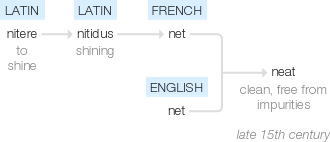Neat
late 15th century (in the sense ‘clean, free from impurities’): from French net, from Latin nitidus ‘shining’, from nitere ‘to shine’; related to net2. The sense ‘bright’ (now obsolete) was recorded in English in the late 16th century.
wiktionary
From Middle English *nete, net, nette(> Modern net "after deductions, unadulterated"), from Anglo-Norman neit(“good, desireable, clean”), a variant of Old French net, nette("clean, clear, pure"; from Latin nitidus(“gleaming”), from niteō(“I shine”)).
From Middle English nete, neat, from Old English nēat(“animal, beast, ox, cow, cattle”), from Proto-Germanic *nautą(“foredeal, profit, property, livestock”), from Proto-Indo-European *newd-(“to acquire, make use of”). Cognate with Dutch noot(“cow, cattle”, in compounds), dialectal German Noß(“livestock”), Alemannic German Nooss(“young sheep or goat”), Swedish nöt(“cattle”), Icelandic naut(“cattle, bull”) and Faroese neyt(“cattle”) More at note.
etymonline
neat (adj.)
1540s, "clean, free from dirt," from Anglo-French neit, French net "clear, pure" (12c.), from Latin nitidus "well-favored, elegant, trim," literally "gleaming," from nitere "to shine," from PIE root *nei- "to shine" (source also of Middle Irish niam "gleam, splendor," niamda "shining;" Old Irish noib "holy," niab "strength;" Welsh nwyfiant "gleam, splendor").
From 1540s as "well-shaped, well-proportioned; characterized by nicety of appearance." Meaning "inclined to be tidy" is from 1570s; sense of "in good order" is from 1590s. Of liquor, "straight, undiluted," c. 1800, from meaning "unadulterated" (of wine), which is first attested 1570s. Informal sense of "very good, desirable" is noted by 1934 in American English, but in many earlier senses in English since 17c. neat seems to be simply a vague commendatory word; variant neato is teenager slang, by 1968. Related: Neatly; neatness.
neat (n.)
"oxen, bullocks, cows, bovine cattle collectively," Old English neat "ox, beast, animal," singularly or collectively, from Proto-Germanic *nautam "thing of value, possession" (source also of Old Frisian nat, Middle Dutch noot, Old High German noz, Old Norse naut), from PIE root *neud- "to make use of, enjoy." Related: Neatherd; neats-foot.
